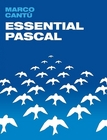
The cover of the 4th edition of Essential Pascal, the first available in print (and PDF) on Lulu.com. |
Marco Cantù's
|
The Object Pascal programming language we use in Delphi wasn't invented in 1995 along with the Borland visual development environment. It was simply extended from the Object Pascal language already in use in the Borland Pascal products. But Borland didn't invent Pascal, it only helped make it very popular and extended it a little...
This chapter will contain some historical background on the Pascal language and its evolution. For the moment it contains only very short summaries.
Wirth's Pascal
The Pascal language was originally designed in 1971 by Niklaus Wirth, professor at the Polytechnic of Zurich, Switzerland. Pascal was designed as a simplified version for educational purposes of the language Algol, which dates from 1960.
When Pascal was designed, many programming languages existed, but few were in widespread use: FORTRAN, C, Assembler, COBOL. The key idea of the new language was order, managed through a strong concept of data type, and requiring declarations and structured program controls. The language was also designed to be a teaching tool for students of programming classes.
Turbo Pascal
Borland's world-famous Pascal compiler, called Turbo Pascal, was introduced in 1983, implementing "Pascal User Manual and Report" by Jensen and Wirth. The Turbo Pascal compiler has been one of the best-selling series of compilers of all time, and made the language particularly popular on the PC platform, thanks to its balance of simplicity and power.
Turbo Pascal introduced an Integrated Development Environment (IDE) where you could edit the code (in a WordStar compatible editor), run the compiler, see the errors, and jump back to the lines containing those errors. It sounds trivial now, but previously you had to quit the editor, return to DOS; run the command-line compiler, write down the error lines, open the editor and jump there.
Moreover Borland sold Turbo Pascal for 49 dollars, where Microsoft's Pascal compiler was sold for a few hundred. Turbo Pascal's many years of success contributed to Microsoft's eventual cancellation of its Pascal compiler product.
Delphi's Pascal
After 9 versions of Turbo and Borland Pascal compilers, which gradually extended the language, Borland released Delphi in 1995, turning Pascal into a visual programming language.
Delphi extends the Pascal language in a number of ways, including many object-oriented extensions which are different from other flavors of Object Pascal, including those in the Borland Pascal with Objects compiler.
Next Chapter: Coding in Pascal